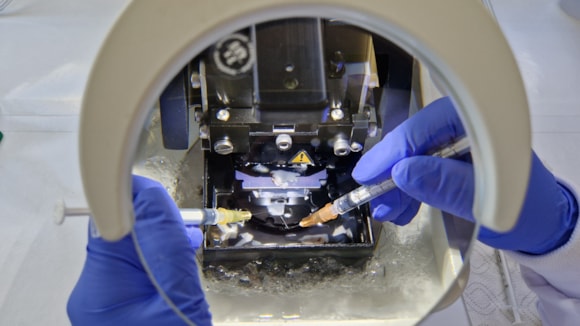Scientists at the University of Edinburgh have made a ground-breaking discovery in Alzheimer’s research by using living human brain tissue to observe how a toxic protein, amyloid beta, damages the connections between brain cells.
The study, published in Nature Communications, marks the first time researchers have directly seen the harmful form of amyloid beta bind to and impair synapses — the crucial links that enable communication between neurons. Unlike exposure to the normal version of the protein, the brain tissue did not attempt to repair itself when faced with the toxic form.
Tiny fragments of healthy brain tissue, donated by patients undergoing routine neurosurgery, were kept alive in the lab for several weeks using pioneering methods. This innovative approach, developed as part of the Dyson RAD Dementia Research Acceleration Project, provides a rare opportunity to study Alzheimer’s in living human cells.
The research, led by Dr Claire Durrant, a Race Against Dementia (RAD) Dyson Fellow and UK Dementia Research Institute Emerging Leader at the Centre for Discovery Brain Sciences at the University of Edinburgh, revealed that even slight changes in amyloid beta levels could disrupt brain function — suggesting a delicate ‘sweet spot’ of the protein is necessary for healthy brain activity.
“Working alongside the neurosurgical team at the University of Edinburgh, we have shown that living human brain slices can be used to explore fundamental questions relating to Alzheimer’s disease.” said Dr Durrant. “We believe this tool could help accelerate findings from the lab into patients, bringing us one step closer to a world free from the heartbreak of dementia.
The study also found that samples taken from the temporal lobe — a region affected early in Alzheimer’s — released higher levels of another disease-related protein, tau, helping to explain the vulnerability of this brain area.
Some brain samples already showed early signs of Alzheimer’s, such as amyloid plaques and tau tangles, even though donors were not diagnosed with the disease. Researchers say this model opens the door to studying the disease at its earliest stages.
The project has been supported by a £1 million donation from the James Dyson Foundation and a fellowship from Sir Jackie Stewart’s charity, Race Against Dementia. The collaboration brings together expertise from Formula One, Dyson’s engineering innovation, and academic neuroscience to speed up progress in dementia research.
Sir Jackie Stewart OBE, founder of Race Against Dementia, which has supported Dr Durrant’s laboratory since 2019, said: “It’s a horrendous reality that as things stand, one in three people born today, will die with dementia. Someone develops dementia every three seconds – and we still don’t have a cure.”
“Our collaboration across industries allows us to think keener and faster and the breakthrough that we have achieved shows what is possible when science moves faster, with new tools and fresh thinking. Our unique program is enabling us to test potential treatments which are bringing us closer to a world without dementia.”
James Dyson, Founder of Dyson, said: “I’ve been delighted to support Dr Durrant’s novel approach. Working with brain surgeons and their consenting patients nationwide to collect samples of living human brain and keep them alive in the lab is a groundbreaking method.”
Professor Tara Spires-Jones, Group Leader at the UK Dementia Research Institute, called the study “cutting-edge” and said it added a crucial new tool for investigating Alzheimer’s in human brain cells.





